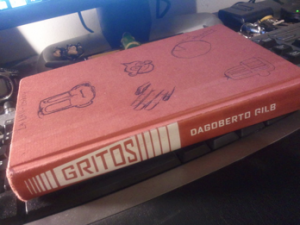Dagoberto Gilb’s “Gritos” Culturally Relevant, Insightful
If you haven’t read any of Dagoberto Gilb’s work, this could be your opportunity to get a glimpse of his style. “Gritos” for me was very pleasant and culturally appealing; his essays are impregnated with his cultural roots and a human perspective that is very universal and appealing to those with a heart. Not only are we presented with a very detailed, insightful style — one of Gilb’s acclaimed attributes — but also detailed chapters of Gilb’s life. They both come a very well organized, four-sectioned structure. Each section is focused on his own personal perspective about different border life issues and personal lived experiences that become interlaced by an everyday feeling experience.
For example section one, “Culture Crossing,” focuses on the mixture of cultures that the border is subject to due to its geographical location and politically drawn division. Gilb illustrates the spillage of culturally accepted traditions and behaviors people along the border have. The essay about cockfights, “Los Gallos,” in this section explains some of the reasons this tabooed sport is still practiced, appreciated and accepted amongst Mexicans, Mexican Americans and anglos in the United States. You will be surprised at the historical weight this “sport” has, and also some of the humble characteristics that accompany its practice — this isn’t a high class sophisticated city-like sport.
Section two focuses on the brown/white collision and the prejudices that are involved. This section is titled “Cortes and Malinche.” In this section and in the essay titled “L.A. Navidad,” Gilb shares a racial insult his wife was a victim of: “stupid Mexican.” And even though the essay is pretty brief and quick — just as every racial insult is — its content explains a very vast and overtly lived conflict amongst ethnicities: racism. Gilb’s style applied on this essay makes this very complicated issue seem simple by the brief amount of material given to the reader. Making the reader create his or her own opinion, and not imposing his own personal view about the issue.
Section three, “The Writing Life,” is dedicated to his professional life as a writer and teacher. On his essay “This Writer’s Life” Gilb explains his writing style. He also explains the reason the not so rich and fancy characters of his stories. Gilb justifies his style of writing and characters with his way of life, the people he lives with, and also his experiences as a living human. This is one of the reasons Gilb’s writing attributes appealed to my attention — because we do not write about things we do not live.
On section four titled “Working Life and La Familia,” Gilb shows chapters of his life related to the title itself. On the essay, “Poverty Is Starting Over,” he talks about his son’s baseball team (which by the way is awesomely great with a .500 average). He gives a brief glimpse of how bad their team coaching is, and how deficient their equipment is. These deficiency issues become magnified by the reality the parents of the baseball players live in — precarious to say the least. Gilb worries about his raza and expresses it by writing about their lifestyle — which by the way it is also his lifestyle. His straight-up honest perspective leaves no room for doubt and questioning about the way things are around him.
“Gritos” is not only a book that illustrates the well-lived continuing life of Dagoberto Gilb, but it also expresses the sentiments and feelings about realities Mexicans and Mexicans Americans live in the United States and along the border. Gilb is, in my most humble opinion, one of our greatest exponents of Mexican American literature. This book is recommended to any of you who would like to learn and get some of the most beautifully written insight of our Mexican American culture. Also to those who like me live here at the border and like me love it. Hopefully, you all can get to read Gritos and if given the chance, meet Dagoberto Gilb in person. I know I will, someday.
Who said, “Road trip to Victoria, Texas?”
Wuicho Vargas is a writer who lives in McAllen, Texas.


